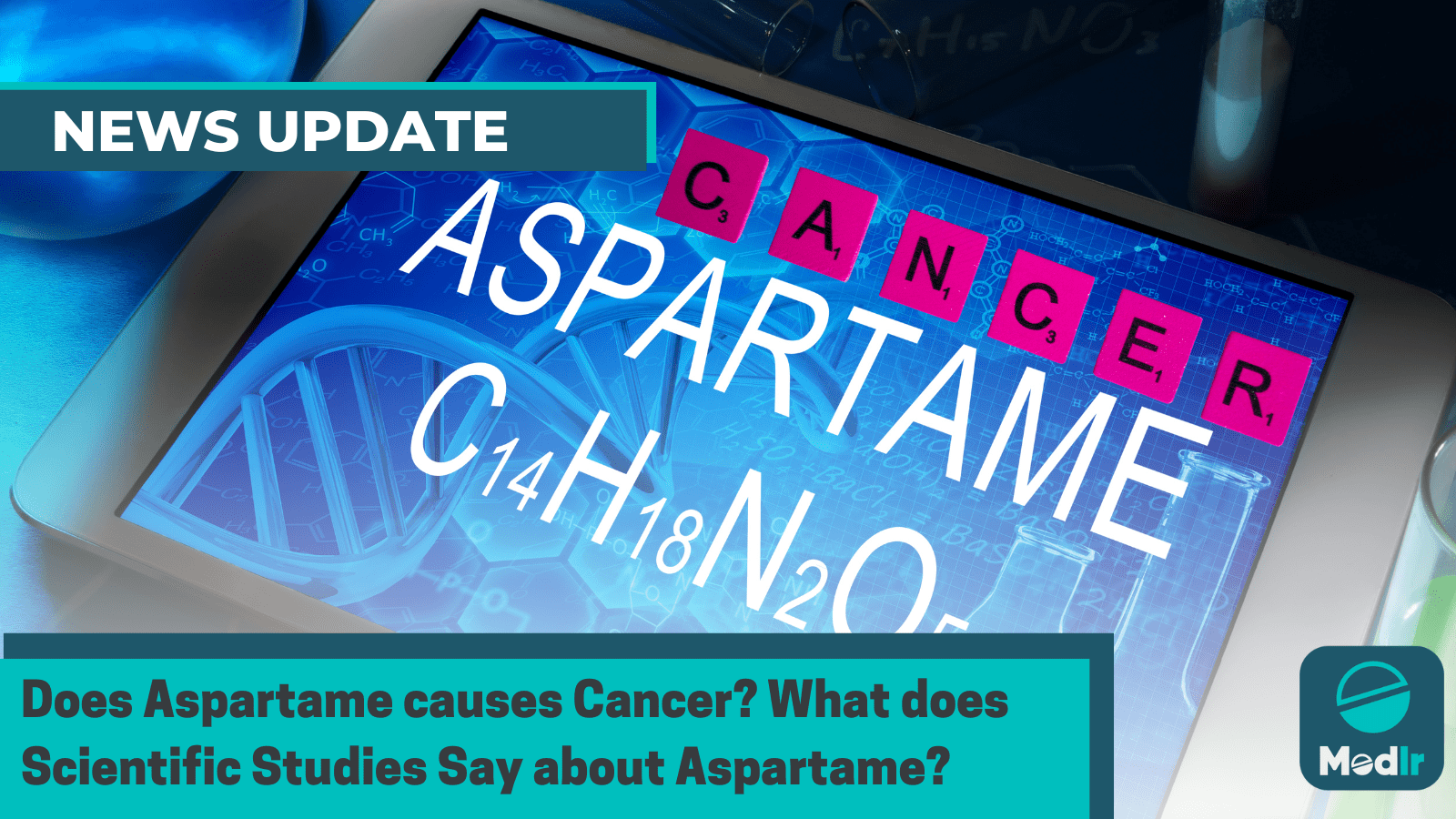Does Aspartame causes Cancer? What does Scientific Studies Say about Aspartame?
Written by Shaveta Arora
Explore the potential link between aspartame and cancer. WHO classifies aspartame as "possibly carcinogenic," while studies suggest associations.

WHO, along with IARC, FAO, and JECFA, conducted the first-ever evaluation of the carcinogenic level of aspartame, an artificial sweetener commonly used in soft drinks. Based on the "limited evidence" available, WHO classified aspartame as "possibly carcinogenic (something that can cause cancer) to humans." The evaluation took place at a meeting in Lyon, France, from June 6 to 13.
According to WHO, aspartame is an artificial (chemical) sweetener that has been widely used in various food and beverage products since the 1980s. The industry commonly uses aspartame as a sugar substitute because it is much sweeter than sugar, allowing for a lower amount to achieve the same level of sweetness.
Manufacturers incorporate this sweetener into prepared foods and beverages, as well as recipes that do not require extensive heating. However, aspartame breaks down when exposed to heat, making it unsuitable for use in baked goods or dishes with high-heat cooking requirements.
Why Is Aspartame in News?
On Thursday, a semi-independent committee for the World Health Organization (WHO) stated that it has determined that aspartame, a popular artificial sweetener found in thousands of products such as diet sodas and sugar-free gum, should be categorized as "possibly carcinogenic to humans."
However, it is important to note that this label does not mean that your diet soda causes cancer.
This classification signifies that the research reviewed by WHO's International Agency for Research on Cancer (IARC) indicates a potential link between aspartame and liver cancer, but the scientific evidence is far from conclusive, as it is for substances like asbestos or tobacco.
Aspartame is Affecting Whom?
Aspartame, a calorie-free artificial sweetener, is approximately 200 times sweeter than table sugar. In a 2009 document, India's food safety and regulation body FSSAI recommended specific maximum permitted levels of aspartame based on the food product in which it is used.
The beverage market heavily relies on aspartame, with approximately 95 percent of carbonated soft drinks containing this sweetener and about 90 percent of ready-to-drink teas using it. This represents a significant portion of the market share for these beverages. So, people consuming people products containing aspartame are being affected by it.
How does Aspartame Affects You?
Numerous studies have examined the impact of aspartame on the brain and body. The research indicates a link between aspartame and a reduced release of dopamine and serotonin, which are the neurological hormones responsible for regulating mood. Additionally, the consumption of aspartame may lead to headaches and dizziness.
Suppliers have criticized these associations, but national organizations are planning to establish a connection between the artificial sweetener and a potential risk of cancer. The WHO categorizes aspartame as a "possible carcinogen," placing it in the lowest category of effectiveness as a carcinogenic substance.
Currently, the recommended daily limit of aspartame is 40 mg per kilogram of body weight. For instance, a 12-ounce can of Diet Coke contains approximately 180 mg of aspartame.
Until updated recommendations are issued, it is important to be aware of the most common foods and beverages that contain aspartame. However, it is essential to check the label as every brand may have different formulations.
What does Scientific Studies Say about Aspartame?
In the 1980s, animal studies conducted on aspartame demonstrated no cancer-causing effects, even at high doses, and no DNA damage. However, subsequent studies raised concerns about a potential association with cancer, leading to a new evaluation by WHO.
In 2023, WHO's International Agency for Research on Cancer (IARC) made the first-time announcement that aspartame should be categorized as "possibly carcinogenic to humans" due to its potential link to liver cancer. This decision, published in The Lancet Oncology, placed aspartame in the same category as red meat and extremely hot drinks above 149 degrees Fahrenheit, indicating that the scientific evidence was not as conclusive as it is for known carcinogens such as benzene, asbestos, diesel engine fuel, tobacco, and outdoor air pollution.
Observational studies in humans, which cannot establish a direct cause-and-effect relationship, revealed an association between aspartame and liver, breast, and lymphoma cancers, as well as an impact on type 2 diabetes. However, further research is necessary to establish a direct link.
What are the Substitutes of Aspartame?
There are several alternative sweeteners available that can be used as substitutes for aspartame. Here are some common ones:
Stevia
Stevia is a natural sweetener derived from the leaves of the stevia plant. It is known for its intense sweetness and zero-calorie content.
Sucralose
Sucralose is an artificial sweetener that is derived from sugar. It is much sweeter than sugar but contains zero calories.
Saccharin
Saccharin is one of the oldest artificial sweeteners. It is highly sweet and has zero calories. However, it has been associated with a bitter aftertaste for some people.
Xylitol
Xylitol is a sugar alcohol that is often used as a sugar substitute. It has a similar sweetness to sugar and contains fewer calories. It is commonly found in chewing gums and oral care products.
Erythritol
Erythritol is another sugar alcohol that provides sweetness without the calories. It has a mild taste and is often used in sugar-free products.
Monk Fruit Extract
Monk fruit extract is a natural sweetener derived from monk fruit. It is much sweeter than sugar and contains zero calories. It is often used in combination with other sweeteners due to its intense sweetness.